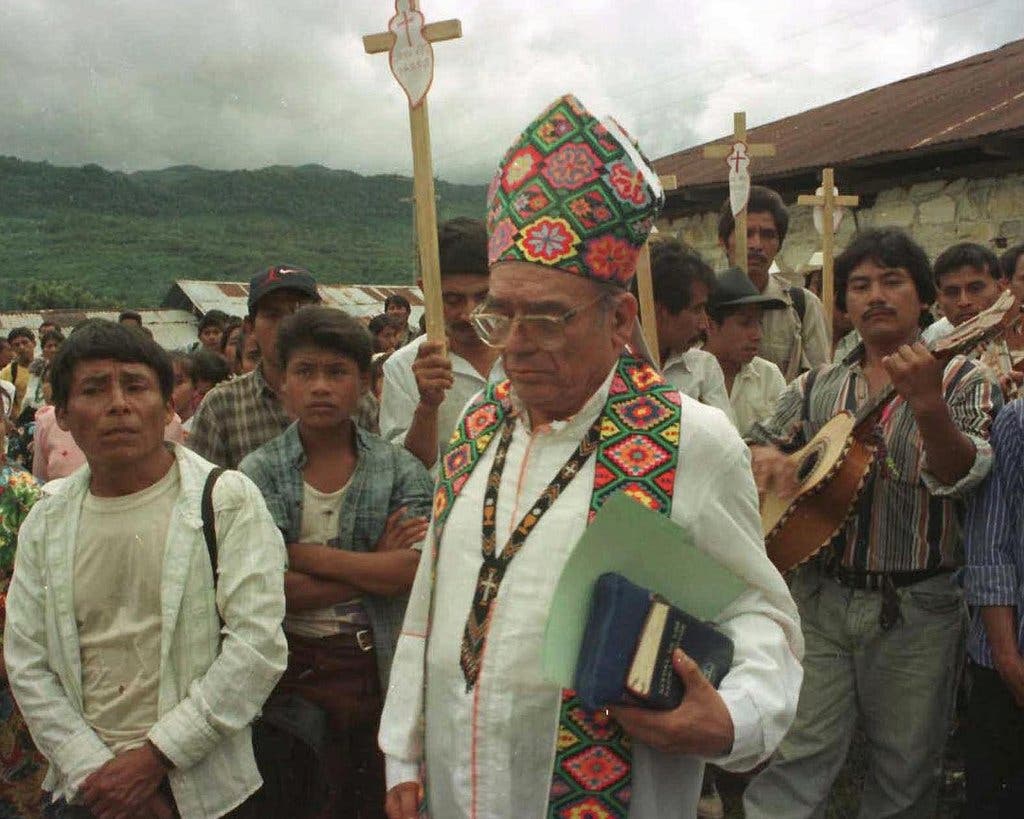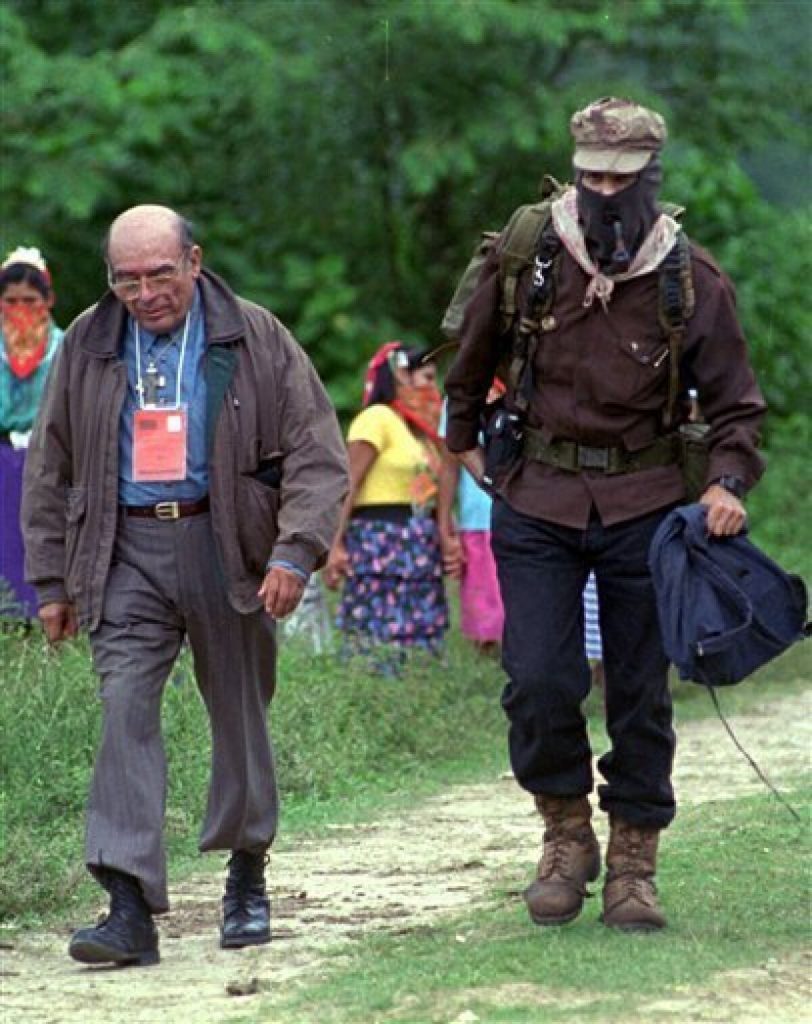Communiqué from the Revolucionary Indigenous Clandestine Committee-General Command of the Zapatista Army of National Liberation
January 2011.
To the people of Mexico:
The Revolutionary Indigenous Clandestine Commitiee–General Command of the Zapatista Army of National LIberation expresses its sorrow for the death of the Bishop Emeritus Don Samuel Ruiz García.
In the EZLN there are militants of different creeds and without any religious beliefs, but the human stature of this man (and that of those, who like him walk on the side of the oppressed, the dispossessed, the repressed, the disdained), calls for our word.
Although the differences, disagreements and distances were neither few nor superficial, today we want to emphasize a commitment and a trajectory that are not only of an individual but of a whole current within the Catholic Church.

Don Samuel Ruiz García not only stood out in a Catholicism practiced in and with the dispossessed, with his team he also trained a whole generation of Christians committed to this practice within the Catholic religion. He not only worried about the grave situation of misery and marginalization of the indigenous peoples of Chiapas, he also worked, together with a heroic pastoral team, to improve these shameful conditions of life and death.
What the governments purposely forgot in cultivating death, was made a memory of life in the Diocese of San Cristóbal de Las Casas.
Don Samuel Ruiz García and his team not only strove to achieve peace with justice and dignity for the indigenous people of Chiapas, they also risked and still risk their lives, liberty and property on that road truncated by the arrogance of political power.
Even long before our uprising in 1994, the Diocese of San Cristóbal suffered harassment, attacks and slander from the Federal Army and the state governments in office.
At least since Juan Sabines Gutiérrez (remembered for the massacre in Wolonchan in 1980, and up through General Absalón Castellanos Domínguez, Patrocinio González Garrido, Elmar Setzer M., Eduardo Robledo Rincón, Julio César Ruiz Ferro (one of the authors of the massacre of Acteal in 1997), and Roberto Albores Guillén (better known as “el croquetas”), the governors of Chiapas harassed those in the Dioceses that opposed their massacres and the management of the State as if it were a Porfirian1 hacienda.
Since 1994, during his work in the National Commission of Mediation (CONAI), in the company of men and women that made up the peace entity, Don Samuel received pressures, harassment, and threats, including attempts on his life by the paramilitary group called “Paz y Justicia” (Peace and Justice).
And as president of the CONAI, in February of 1995, Don Samuel also suffered the threat of imprisonment.
Ernesto Zedillo Ponce de León, as part of a diversionary strategy (as it is done today) to hide the serious economic crisis to which he and Carlos Salinas de Gortari have subjected the country, he reactivated the war against the Zapatista indigenous communities.
At the same time that he launched the great military offensive against the EZLN (the same one that failed), Zedillo attacked the National Intermediation Commission.
Obsessed with the idea of finishing off Don Samuel, the then-president of Mexico, now employed by transnational corporations, took advantage of the alliance which, under the tutelage of Carlos Salinas de Gortari and Diego Fernández de Cevallos, had been forged between the PRI and the PAN2.
In those days, in a meeting with the Catholic ecclesiastical leadership, the then Attorney General of the Republic, member of the PAN and fanatic of spiritualism and witchcraft, Antonio Lozano Gracia, brandished a document to Don Samuel Ruiz Garcia with a warrant for his arrest.
And they say that the Attorney General, a graduate of the Occult Sciences, was confronted by the rest of the bishops, among them Norberto Rivera, who came out in defense of the head of the Diocese of San Cristóbal.
The PRI-PAN alliance (later joined by the PRD and PT3) against the progressive Catholic Church, did not stop there. Attacks, slander and attempts against the members of the Diocese were sponsored from both federal and state governments.
The Federal Army did not stay behind. At the same time that it financed, trained
The Federal Army was not left behind. At the same time that it financed, trained and equipped paramilitary groups, it promoted the idea that the Diocese was sowing violence.
The thesis at the time (and which today is repeated by idiots on the left) was that the Diocese had trained the EZLN’s rank and file and leadership cadres.
A button of the broad sampling of these ridiculous allegations was given when a general showed a book as proof of the connection of the Diocese with the “transgressors of the law.”
The title of the incriminating book is “The Gospel according to St. Mark”.
Still today these attacks have not ceased.
The Human Rights Center “Fray Bartolomé de Las Casas” continuously receives threats and harassment.
In addition to being founded by Don Samuel Ruiz García and having a Christian inspiration, “Frayba” has as “aggravating crimes” a belief in the Integrity and Indivisibility of Human Rights, respect for cultural diversity and the right to Self-Determination, holistic justice as a requirement for peace, and the development of a culture of dialogue, tolerance and reconciliation, with respect for cultural and religious plurality.
[There is]Nothing more annoying than these principles.
And this annoyance goes all the way to the Vatican where there are maneuvers to split the Diocese of San Cristóbal in two, as a way to dilute the option of in, for and with the poor, into something more accomodating that washes conscience in money. Taking advantage of the death of Don Samuel, that project of control and division is being revived.
Because up there, they understand that the option for the poor doesn’t die with Don Samuel. It lives and moves throughout that sector of the Catholic Church that decided to practice what was preached.
Meanwhile, the pastoral team, and especially the deacons, ministers and catechists (Catholic indigenous people of the communities), suffer the defamation, insults and attacks of the neo- lovers of war. Power still longs for its days of lordship and it sees in the work of the Diocese an obstacle to reinstating its regime of gallows and knife.
The grotesque parade of characters of local and national political life in front of Don Samuel’s casket is not to honor him, but to verify, with relief, that he has died; and the local media pretends to mourn what in reality they are celebrating.
Beyond all those attacks and ecclesiastical conspiracies, Don Samuel Ruiz García and the cristians like him, had, have and will always have a special place in the dark heart of the Zapatista indigenous communities.
Now that it is fashionable to condemn the entire Catholic Church for the crimes, excesses, commissions and omissions of some of its clergy…
Now that the self-styled “progressive” sector is so fond of mocking and deriding the Catholic Church in its entirety….
Now that it is encouraged to see in every priest a potential or active pederast…
Now it would be good to turn and look down and find there those that, like Don Samuel before them, distrusted and defied Power.
Because these Christians firmly believe that justice should reign in this world also.
And so it is that they live, and die, in thought, word, and deed…
Because while it is certain that there are Marciales y Onésimos in the Catholic church, there also were and are Roncos, Ernestos, Samueles, Arturos, Raúles, Sergios, Bartolomés, Joeles, Heribertos, Raymundos, Salvadores, Santiagos, Diegos, Estelas, Victorias, and thousands of religious and lay people who, being on the side of justice and freedom, are on the side of life.
In the EZLN, today, both Catholics and non-Catholics, believers and non-believers, we not only honor the memory of Don Samuel Ruiz García.
We also, and above all, salute the consistent commitment of the Christians, and believers, in Chiapas, in Mexico and in the world, who do not remain in complicit silence in the face of injustice, nor paralyzed in the face of war.

Don Samuel is gone, but many remain, many others who, within and because of the Catholic Christian faith, struggle for an earthly world that is more just, a freer, and a more democratic, that is, a better world.
Cheers to them, for it is from their long nights that tomorrow will be born.
¡LIBERTY!
¡JUSTICE!
¡DEMOCRACY!
From the Mountains of Southeast Mexico
For the Revolucionary Indigenous Clandestine Committee -General Command of the EZLN.
Lieutenant Colonel Insurgent Moisés
Subcomandante Insurgente Marcos
Mexico, January 2011.
This was originally released on January 26, 2011 and is published on Enlace Zapatista. https://enlacezapatista.ezln.org.mx/2011/01/26/26-enero-el-ccri-cg-del-ezln-manifiesta-pesar-por-don-samuel-ruiz-garcia/ English interpretation published by Schools for Chiapas on January 26th, 2022.
Footnotes
- Porfirian refers to the presidencies (or dictatorship) of Porfirio Diaz (1877-1880, 1884-1910). This time, while a period of tremendous economic benefit for some, was a time of debt peonage and rising social ills among the rural and poor populations.
- Respectively, the Institutional Revolutionary Party and the National Action Party.
- Respectively, the Party of the Democratic Revolution and the Workers’ Party.
